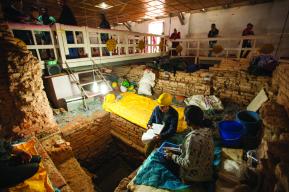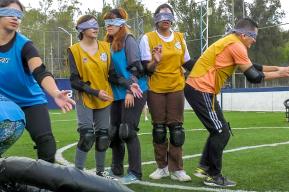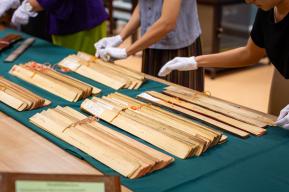The intergovernmental scientific UNESCO Man and the Biosphere (MAB) Programme aims to establish a scientific basis for enhancing the relationship between people and their environments. Its World Network of Biosphere Reserves combines natural and social sciences with a view to improving human livelihoods and safeguarding natural and managed ecosystems. It is a powerful tool to engage local stakeholders with the surrounding nature and to re-establish human interdependency with the environment. Biosphere reserves are examples of best practices in integrating economic development with a culturally and environmentally aware management approach.
The UNESCO Regional Bureau for Science and Culture in Europe has been at the forefront of promoting the important role of biosphere reserves in sustainable development in South-East Europe and part of the Mediterranean, encouraging dialogue between sites.
The impact of the pandemic on biosphere reserves is multifaceted and has both short-term and long-term effects. Examples of short-term effects include suspension of sites management and restoration programmes, reduced revenue of tourism and local businesses resulting in the loss of employment and livelihoods for the local communities. In the long run, the global economic crisis induced by the pandemic has resulted in government funding reallocation to other priorities with the risk of reduced environmental regulation and fewer funds allocated for conservation. In this context, UNESCO Regional Bureau, in coordination with the MAB Secretariat, has carried out a survey to assess the impact of COVID-19 on biosphere reserves, collect best practices and explore the way forward together with all members of the MAB community in the region.
Following the completion of the survey, the results were discussed during an interactive webinar series titled “Blueprint for the Next Normal: building back better for and through the biosphere reserves in South-East Europe and the Mediterranean”. The 3 webinars, hosted in consecutive weeks on 23 February, 2 March and 9 March 2021, explored in an interactive and dynamic fashion the discussion on how biosphere reserves could help build back better in the post pandemic period.

The interactive sessions enhanced dialogue among the MAB committees and stakeholders, namely EUROMAB steering committee members, biosphere reserve managers, local businesses, youth representatives, scientists and other key stakeholders, promoting the exchange of ideas and best practices for building back better, with special attention to the vulnerable groups including youth, who have been seriously affected by this crisis.
Three central pillars guided the unfolding of the webinar series with as their aim to collectively create a blueprint for biosphere reserves of the region to build back better; restore, conserve and amplify. The focus of the webinars was respectively, the vision for building back better, the transformation steps and resourcing the change.
During the sessions, the participants indicated through co-creative discussions that post-COVID restoration should aim at reconciling people and nature to ensure better ecosystems and human health, and showcase participatory sustainable development through dissemination, intergenerational education and research opportunities.

Conservation should instead focus on mobilizing knowledge on key ecosystems provided by committed stakeholders by creating regenerative and sustainable travel experiences, implementing digital tools use and strengthening the network of local businesses within the biosphere reserves.
Finally, the attendants pointed out that to amplify the reach of the recovery efforts, youth should be key and engaged; access to knowledge and opportunities should be guaranteed to them. This could be achieved by developing hybrid education models and investing in long-term employment opportunities for young people within the scope of the biosphere reserves.
The value of this event was to shine a light on how biosphere reserves can provide linkages between the immediate response and a longer-term recovery, and accelerate transformation towards a new and better normal, as they support local livelihood diversification, promote inclusive and sustainable economic growth, and employment for all.
The results of the webinar series will be fed into the global MAB “Blueprint for the Next Normal” being developed by the MAB Secretariat as well as form part of the MAB 50th anniversary activities. The blueprint, still in development, is expected to scale up to the broader MAB network.









